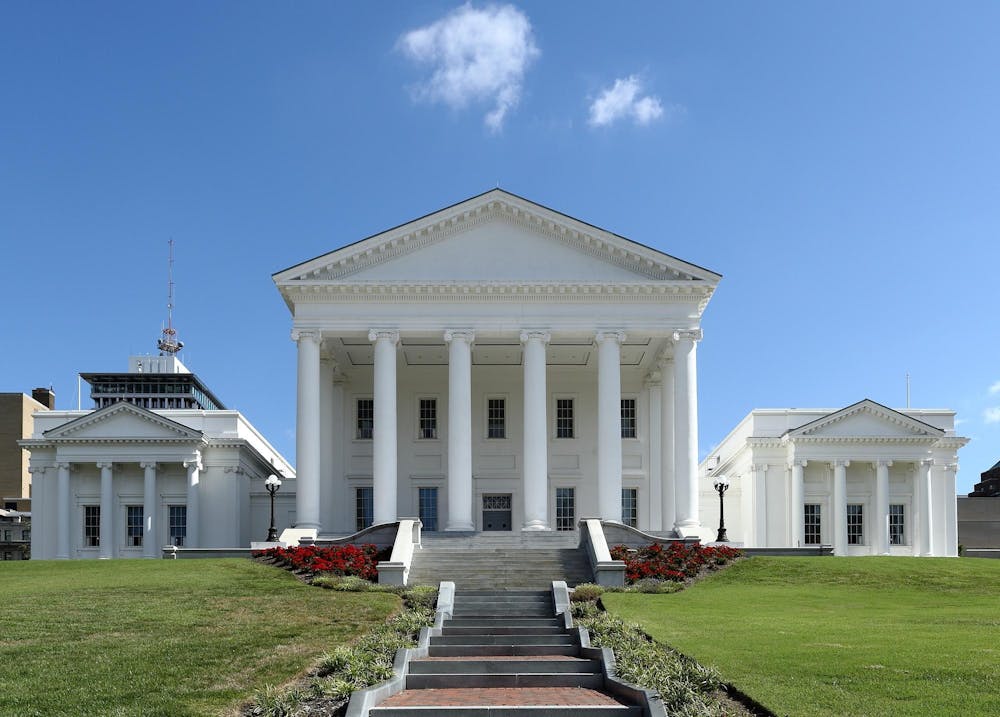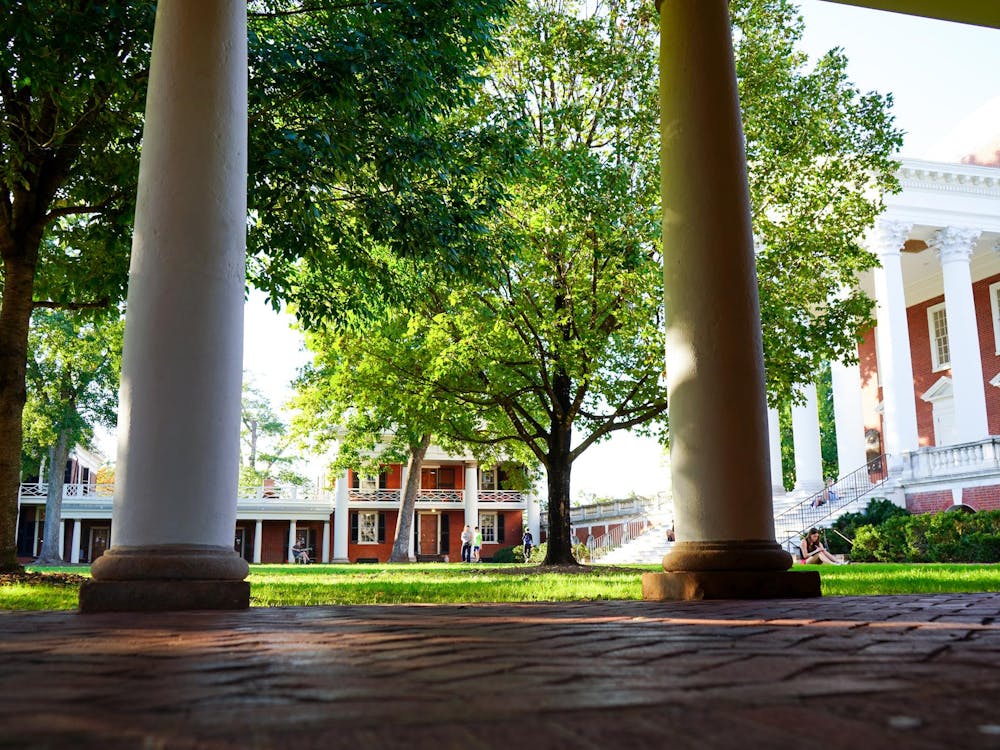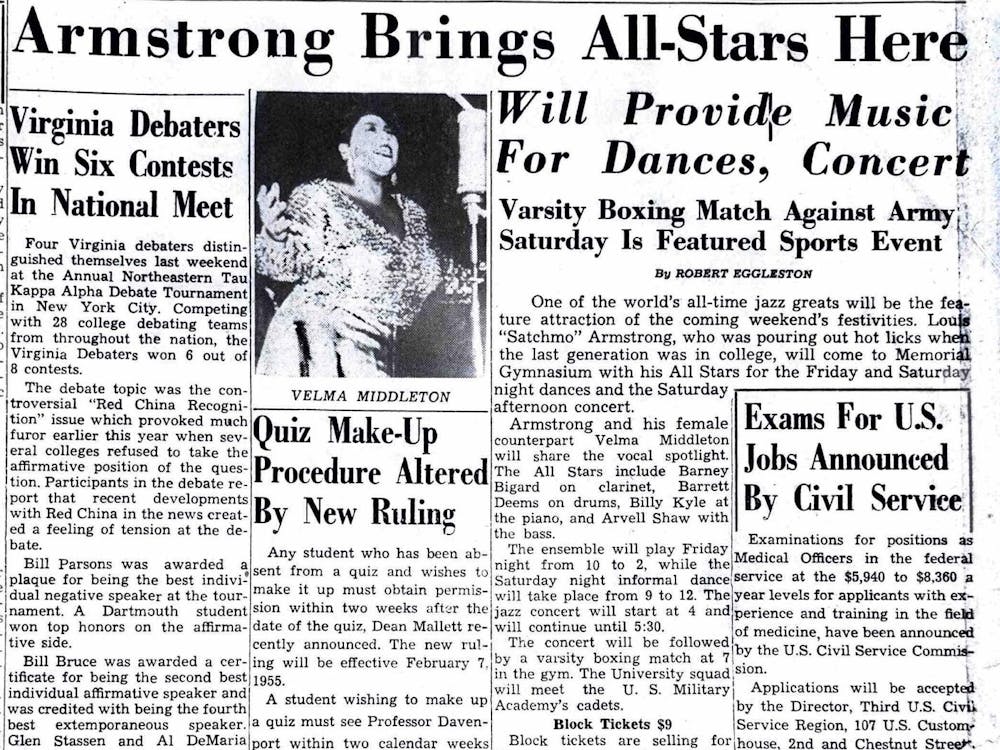A Fairfax County judge ruled July 29 that Gov. Glenn Youngkin’s appointees to three university boards are no longer able to serve, including Ken Cuccinelli, former Virginia Attorney General and Class of 1991 alumnus. Republican Attorney General Jason Miyares filed an appeal Monday, arguing that keeping the appointees would not have caused the “irreparable harm” Frieden claimed in his ruling.
Miyares said, in his appeal petition to the Virginia Supreme Court, that the Senate Privileges and Elections Committee could not legally deny the appointees in the first place. The July 29 ruling and Miyares’ subsequent appeal mark key points in the summer-long debate over what power the Committee has in denying gubernatorial appointments.
Judge Jonathan D. Frieden wrote in his July 29 ruling that following the Senate Privileges and Elections Committee’s rejection of Youngkin’s eight appointees to three statewide university boards, the appointees can no longer serve on their respective boards.
This includes four at George Mason University, three at the Virginia Military Institute and one at the University, leaving a vacant seat on the University’s Board of Visitors, where Cuccinelli had been sitting since his appointment in March.
The denied appointees are now not recognized as official members and they can not vote, attend or participate in meetings. Frieden said that each board will continue to fulfill their duties, only with fewer members. The rectors will also be able to continue presiding over meetings.
The lawsuit stems from a dispute over the validity of the Committee’s June vote to not confirm Youngkin’s appointees. Democrats argued that following the Committee’s vote, the appointees must step down from their positions immediately. The Republicans, however, argued that the appointees must be voted on by the entire General Assembly, not solely the Committee. At the direction of Miyares, the appointees did not step down and the Democrats filed a legal suit.
Frieden’s decision in the legal suit revolved around two main questions — first, whether the Committee was legally allowed to deny the appointees in the first place, and second, whether keeping the appointees would have caused “irreparable harm,” granting intervention from the court.
For the first question, Frieden sided with the plaintiffs, saying that the Committee’s rejection of the appointees meant a rejection on behalf of the entire Senate, and therefore a rejection on behalf of the entire General Assembly.
“The Senate’s rejection of the Confirmation Resolution…constitutes the refusal of the General Assembly to confirm the Disputed Appointees,” the ruling reads.
In order for a resolution to be passed, it must be voted out of committee before being approved by both chambers. Therefore, Frieden wrote, there is no need for the resolution to move to a full General Assembly vote if the Committee had already rejected it on behalf of one of the chambers.
Chris Michel, attorney for the three rectors at the involved universities, disagreed with this perspective in the Fairfax Court hearing July 25.
“The suit seeks a shortcut around the constitutionally prescribed process for refusing appointees, which, by its text, requires action by the General Assembly, not merely one committee,” Michel said.
Michel works for Quinn Emanuel Urquhart & Sullivan, one of two law firms which Miyares appointed as special counsel to conduct a review of the University’s threat assessment process during the Nov. 13, 2022 shooting.
Nevertheless, Frieden said that it is a violation of the Virginia Constitution for the appointees to continue to serve on the universities’ governing boards after being rejected by the Committee.
“The Constitution of Virginia provides that ‘[n]o person appointed to any office by the Governor, whose appointment is subject to confirmation by the General Assembly, under the provisions of this Constitution or any statute, shall enter upon, or continue in, office after the General Assembly shall have refused to confirm his appointment’,” Frieden wrote.
As for the second question, of whether keeping the appointees would have caused “irreparable harm,” Frieden also sided with the plaintiffs.
Frieden said that in order to demonstrate entitlement to a preliminary injunction, the Senate Democrats must show that they will “more likely than not suffer irreparable harm” without the injunction.
A preliminary injunction is a court order issued in a lawsuit before the case is fully decided. The order is supposed to prevent a certain party from taking further action that would cause irreparable harm to the other party. In this case, the injunction is preventing the denied appointees from continuing to serve on their respective boards.
Mark Stancil, the attorney representing the plaintiffs in the case, argued in the hearing that the violation of Virginia’s Constitution constitutes “clear irreparable injury.” He said that the appointees continuing to serve essentially nullifies the legislators’ votes, undermining the power of the Committee given to them in the Constitution.
Michel countered Stancil, arguing that the Senate Democrats never referenced specific, tangible examples of this injury, therefore not granting them the right to a preliminary injunction.
“[The Senate Democrats] are saying they are personally harmed by the ongoing service of these appointees, and they simply haven't pointed to any tangible way in which that harm has been manifested,” Michel said.
Stancil also mentioned that the decisions being made by the boards while the rejected appointees are serving may further cause irreparable injury.
“I'd be remiss not to mention the significant decisions being made at these universities … These are not quiet summers,” Stancil said. “It will have lasting effects, we believe, on these universities and on the senators’ important role in defending these principles.”
Over the summer, Boards of the involved universities have played roles in significant changes at their respective schools. Former University president Jim Ryan resigned in June following pressure from the Department of Justice. Since his resignation, the Faculty Senate and the Student Council have passed resolutions of no confidence in the Board.
The GMU Board of Visitors, on the other hand, voted to maintain President Gregory Washington despite pressure from the federal government. Washington also received a raise in his salary following the GMU Board’s vote.
Ultimately, Frieden ruled that a preliminary injunction was needed to protect the power of the General Assembly to confirm gubernatorial appointees. He also said that the injunction would serve public interest.
“The public interest is served by ensuring that the will of the voters is manifested, through ensuring the proper exercise of both the Governor’s power to appoint and the General Assembly’s power to confirm,” Frieden wrote. “Here, a preliminary injunction is necessary to do that.”
Four of Youngkin’s appointees to the University Board that are currently serving have not yet been confirmed by the Committee — Adjunct Law Prof. James Donovan, Class of 1982 alumnus John F. Harris, H. Eugene Lockhart, Class of 1972 and 1974 alumnus, and Class of 1990 alumna Calvert Saunders Moore.
Because these appointees have not yet been voted on by the Committee, Frieden’s ruling does not apply to them. These four appointees will continue to serve unless the Committee chooses to deny them.
These four appointees were present at the Board’s special meeting Aug. 4, where the Board announced the appointment of Paul Mahoney, former dean of the School of Law, as interim University president.
Senate Majority Leader Scott Surovell, D-Fairfax, told The Cavalier Daily following former University President Jim Ryan’s resignation that those four appointees may never be confirmed. He said that the Senate Democrats have hopes of reforming the appointment process as a whole once a new governor comes into office in January.
If the Democrats choose to deny these four pending appointees, they could wait until Youngkin makes new appointments, confirm them and fill the vacant seats.
However, according to Surovell’s statement, it seems that the Senate Democrats are more likely to deny these four pending appointees and refuse to confirm any new ones until there is a new governor, leaving a total of five vacancies of the 17 seats on the Board until January.
Quorum for major Board decisions, including the appointment of a new president, requires 11 voting members to be present. If the Committee refuses to confirm the four pending appointees, and the vacancy where Cuccinelli sat remains, the Board will have 12 voting members, only one greater than quorum requires.
In order to approve or deny the appointees, the Committee would need to do so at a Committee meeting. Currently, there is no such meeting scheduled.
With Miyares’ appeal Monday, the Virginia Supreme Court now has the power to decide whether Youngkin’s appointees can serve while the lawsuit is ongoing. A majority of justices on the Virginia Supreme Court were appointed by Democratic governors.
The Virginia Supreme Court could either stay the injunction, solidifying Frieden’s decision, or overturn the decision, allowing the appointees to serve until the case is fully heard. However, Frieden said that it is unlikely for the ruling to change.
Xander Tilock contributed reporting.







